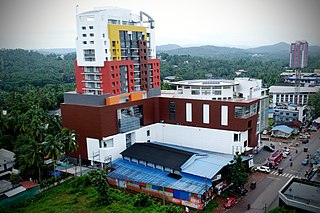
Malappuram, is one of the 14 districts in the Indian state of Kerala, with a coastline of 70 km (43 mi). The most populous district of Kerala, Malappuram is home to around 13% of the total population of the state. The district was formed on 16 June 1969, spanning an area of about 3,554 km2 (1,372 sq mi). It is the third-largest district of Kerala by area. It is bounded by Western Ghats and the Arabian Sea on either side. The district is divided into seven Taluks: Eranad, Kondotty, Nilambur, Perinthalmanna, Ponnani, Tirur, and Tirurangadi.
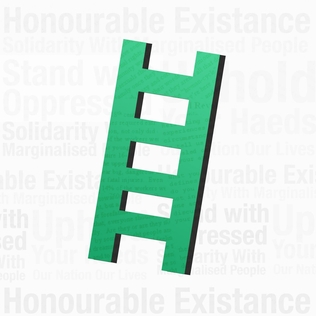
Indian Union Muslim League is a political party primarily based in Kerala. It is recognised as a State Party in Kerala by the Election Commission of India.

Malabar Muslims or Muslim Mappilas are members of the Muslim community found predominantly in Kerala and the Lakshadweep islands in Southern India. The term Mappila (Ma-Pilla) is used to describe Malabar Muslims in Northern Kerala. Muslims share the common language of Malayalam with the other religious communities of Kerala.

The United Democratic Front (UDF) is the Indian National Congress-led alliance of centre to centre-right political parties in the Indian state of Kerala. It is one of the two major political alliances in Kerala, the other being Communist Party of India (Marxist)-led Left Democratic Front, each of which has been in power alternately since 1980 E. K. Nayanar ministry. Most of the United Democratic Front constituents are members of the Indian National Congress-led Indian National Developmental Inclusive Alliance at pan-India level.

Islam arrived in Kerala, the Malayalam-speaking region in the south-western tip of India, through Middle Eastern merchants. The Indian coast has an ancient relation with West Asia and the Middle East, even during the pre-Islamic period.
E. Moidu Moulavi (1886–1995) was an Indian National Congress (INC) leader,Islamic scholar, one of the Salafi movements reformers, scholar and educationist of Malabar District, born at Maranchery in Ponnani. He was a supporter of the Islahi movement in Kerala and a co-worker with leaders like K. M. Maulavi, Sayyid Sanaulla Makti Thangal, Mohammed Abdul Rahiman and K. M. Seethi Sahib

Chandrika is an Indian daily newspaper in Malayalam language published from Kozhikode, Kerala. The newspaper currently serves as the mouthpiece of Indian Union Muslim League party in Kerala.
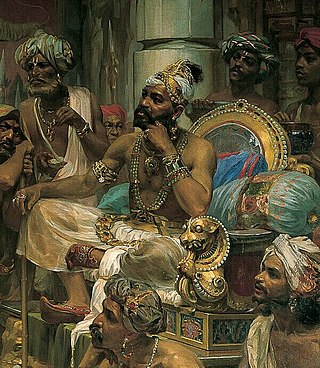
The Samoothiri was the title of the erstwhile ruler and monarch of the Calicut kingdom in the South Malabar region of India. Originating from the former feudal kingdom of Nediyiruppu Swaroopam, the Samoothiris and their vassal kings from Nilambur Kovilakam established Calicut as one of the most important trading ports on the southwest coast of India. At the peak of their reign, they ruled over a region extending from Kozhikode Kollam to the forested borders of Panthalayini Kollam (Koyilandy). The Samoothiris belonged to the Eradi subcaste of the Samantan community of colonial Kerala, and were originally the ruling chiefs of Eranad. The final Zamorin of Calicut committed suicide by setting fire to his palace and burning himself alive inside it, upon learning that Hyder Ali had captured the neighboring country of Chirakkal in Kannur.

Parappanangadi is a major town and a municipality in Tirurangadi taluk of Malappuram district, Kerala, India. It is a coastal town located close to the Arabian Sea.
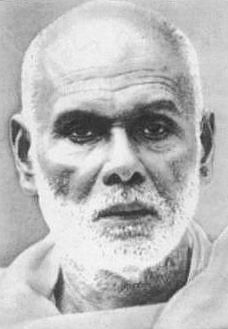
Vakkom Mohammed Abdul Khader Moulavi, popularly known as Vakkom Moulavi was a social reformer, teacher, prolific writer, Muslim scholar, journalist, freedom fighter and newspaper proprietor in Travancore, a princely state of the present day Kerala, India. He was the founder and publisher of the newspaper Swadeshabhimani which was banned and confiscated by the Government of Travancore in 1910 due to its criticisms against the government and the Diwan of Travancore, P. Rajagopalachari. He was an avid reader of Rashid Rida’s Islamic magazine, Al-Manar. Vakkom Moulavi is known as the father of Islamic renaissance in Kerala.
E. T. Mohammed Basheer is an Indian politician and social worker who serves as the Member of Parliament from Ponnani Parliament Constituency of the Indian state Kerala.
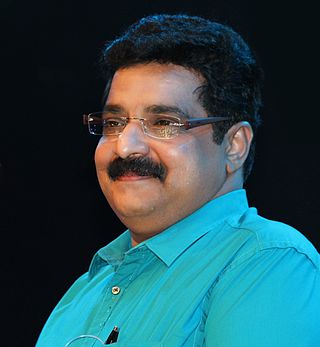
M. K. Muneer is an Indian politician, physician, social worker, singer, poet and author from Kerala. He was the Minister for Social Welfare and Panchayat in the last UDF Ministry, headed by Oommen Chandy and represented the Kozhikode South constituency in the legislative assembly. He was also the Minister for Public Works in A K Antony Ministry 3. Muneer is a State secretary of the Indian Union Muslim League and was the Chairman of the Malayalam TV channel Indiavision. He has written ghazals and books including Fascism and the Sangh Parivar. He is a qualified medical doctor and patron of MCC-THAS-Haemophilia Society.

K. M. Seethi Sahib (1899—1961), born K. M. Seethi, was an Indian politician and community leader from Kerala. He served as the Speaker of Kerala Assembly during 1960-61.

The following outline is provided as an overview of and topical guide to Kerala:
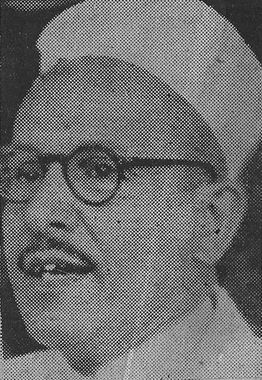
B. Pocker, Badekkandy Pocker, also spelled Poker, title Sahib Bahadur, as an Indian politician and lawyer from Tellicherry, north Kerala, Madras Presidency. He served as a member of the Constituent Assembly of India and as the Member of Parliament from Malappuram Parliamentary Constituency between 1952 and 1962.
Malappuram is one of the 14 districts in the South Indian state of Kerala. The district has a unique and eventful history starting from pre-historic times. During the early medieval period, the district was the home to two of the four major kingdoms that ruled Kerala. Perumpadappu was the original hometown of the Kingdom of Cochin, which is also known as Perumbadappu Swaroopam, and Nediyiruppu was the original hometown of the Zamorin of Calicut, which is also known as Nediyiruppu Swaroopam. Besides, the original headquarters of the Palakkad Rajas were also at Athavanad in the district.
United Front, known until 1971 as Mini Front (1970–1971) and as Maxi Front (1971–1979) thereafter, was a coalition of political parties in Kerala state, India, which was the ruling combine in the state from 1970 to 1979. The coalition was formed by five political parties immediately before the 1970 Kerala Legislative Assembly election. It saw the inclusion a few other parties in the following years.

South Malabar refers to a geographical area of the southwestern coast of India covering some parts of the present-day Kerala state. South Malabar covers the regions included in present-day Kozhikode and Thamarassery taluk of Kozhikode district, Wayanad district excluding Mananthavady taluk, the whole area of Malappuram district, Chavakkad taluk of Thrissur district, and Palakkad district, excluding parts of Chittur taluk. The Fort Kochi region of Kochi city also historically belongs to South Malabar. The term South Malabar refers to the region of the erstwhile Malabar District south to the river Korapuzha, and bears a high cultural similarity to both the Cochin and the North Malabar regions.
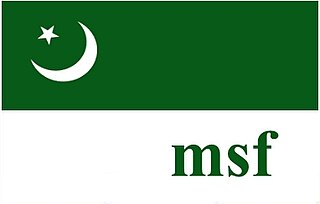
The Muslim Students Federation (MSF) is the student wing of Indian Union Muslim League party in Kerala, India.














